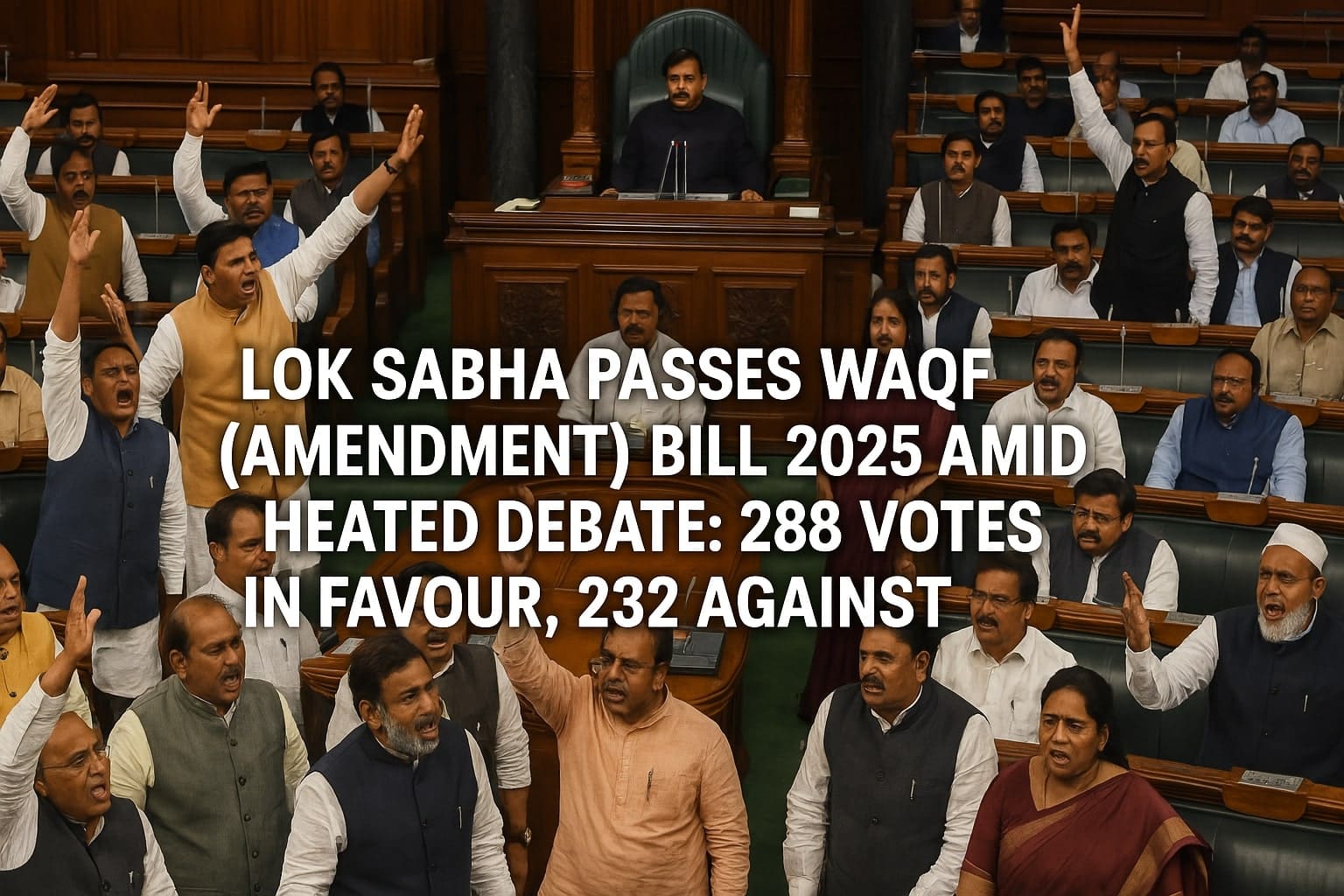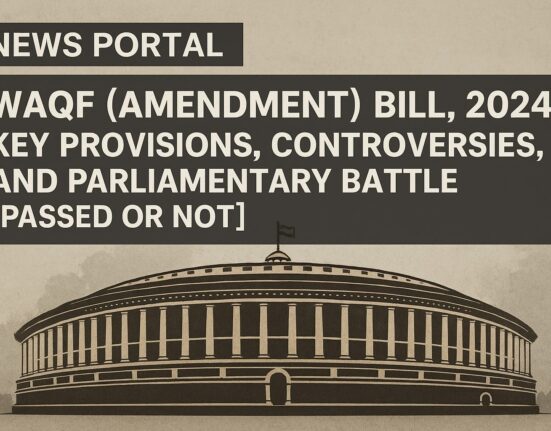In a dramatic and closely contested session, the Lok Sabha passed the Waqf (Amendment) Bill 2025 early Thursday morning with 288 votes in favour and 232 against. The bill, moved by Union Minority Affairs Minister Kiren Rijiju, proposes significant changes to the Waqf Act, 1995, sparking intense debate between the ruling party and the opposition. The House also repealed the Mussalman Wakf Act of 1923 with the passage of the Mussalman Wakf (Repeal) Bill 2024.
Key Highlights of the Waqf (Amendment) Bill 2025
• 288 MPs supported, while 232 opposed the bill after a 12-hour-long debate.
• The legislation aims to regulate the management of Waqf properties, not religious practices.
• Introduces mandatory representation of women and different Muslim sects in Waqf Boards.
• Disputes over Waqf properties will now be settled by senior government officers, not tribunals.
• Proposed inclusion of non-Muslim members in Central and State Waqf Boards for inclusivity.
• Limits Waqf property donations to practicing Muslims (for at least 5 years).
• Ensures women receive inheritance before any property is declared Waqf.
• Replaces the tribunal system with District Collector-level adjudication.
• Introduced under the framework named UMEED (Unified Waqf Management Empowerment, Efficiency and Development).
Government’s Stand on the Bill
Union Minister Kiren Rijiju emphasized that the bill focuses solely on property management and not on religious interference. He accused the previous UPA government of introducing 2013 amendments that allegedly enabled misuse of the Waqf Act, including 123 properties in Delhi’s Lutyens zone being handed over to the Delhi Waqf Board just before the 2014 elections.
Home Minister Amit Shah, defending the bill, reiterated that non-Muslims will not manage religious institutions and that the bill only seeks to curb illegal claims over public and private lands in the name of Waqf. Shah cited several controversial property claims, including temple lands and public parks being declared Waqf, stating, “You cannot donate someone else’s property.”
Support and Endorsements
• Ravi Shankar Prasad (BJP) welcomed the inclusion of women in Waqf boards, highlighting the bill’s aim of gender justice.
• TDP’s Krishna Prasad Tenneti supported the bill, calling it a step towards utilizing Waqf properties worth ₹1.2 lakh crore for social upliftment.
• JD(U) Minister Rajiv Ranjan Singh (Lalan) stated that the bill is pro-Muslim, designed to ensure justice and transparency in property management.
• Shrikant Shinde (Shiv Sena) labeled the legislation as hopeful and progressive, especially under the UMEED framework.
Opposition’s Criticism and Protest
The opposition united in condemning the bill, calling it unconstitutional, anti-minority, and an attempt to undermine the secular fabric of the nation.
• Gaurav Gogoi (Congress) said the bill is a “4D attack on the Constitution” — aiming to dilute, defame, disenfranchise, and divide.
• Akhilesh Yadav (Samajwadi Party) termed the move a diversion tactic from issues like unemployment and inflation.
• TMC MP Kalyan Banerjee called the bill “irrational and arbitrary,” while DMK’s A Raja branded it anti-Muslim.
• Harsimrat Kaur Badal (Shiromani Akali Dal) accused the BJP of exploiting minorities for electoral gains without adequate representation.
• AIMIM chief Asaduddin Owaisi protested by symbolically tearing the bill, invoking Mahatma Gandhi’s defiance of British laws.
Provisions Raising Concern
• Mandatory inclusion of two non-Muslim members in Central and State Waqf Boards.
• Removal of Waqf tribunals, placing final decision-making power with government officials.
• Only practicing Muslims for 5+ years can now dedicate properties as Waqf.
• Inheritance rights must be fulfilled before a property is dedicated as Waqf.
• Government properties claimed as Waqf will revert to state ownership unless proven otherwise.
All India Muslim Personal Law Board’s Reaction
In a strong rebuttal, the All India Muslim Personal Law Board vowed to challenge the bill in court, claiming it infringes on the fundamental rights of Muslims. The board also announced plans to organize peaceful nationwide protests, including roadblocks and awareness campaigns, similar to the farmers’ movement.
Frequently Asked Questions (FAQs)
Q: What is the Waqf (Amendment) Bill 2025?
The Waqf (Amendment) Bill 2025 is a legislative update to the Waqf Act, 1995. It introduces provisions to regulate the management of Waqf properties, ensures greater inclusivity and transparency, and redefines the role of government in Waqf-related disputes.
Q: How many MPs voted in favour of the Waqf Amendment Bill 2025?
A total of 288 Members of Parliament voted in favour, while 232 opposed the bill during its passage in the Lok Sabha.
Q: What major change does the bill bring regarding Waqf property disputes?
The bill replaces Waqf Tribunals with senior government officers (above the rank of District Collector) who will now adjudicate property ownership disputes involving Waqf land.
Q: Does the bill allow non-Muslims to be part of Waqf Boards?
Yes, the bill proposes inclusion of two non-Muslim members in both Central and State Waqf Boards for transparency and inclusivity. However, the government clarified they won’t interfere in religious management roles.
Q: What is the ‘UMEED’ framework mentioned in the bill?
UMEED stands for Unified Waqf Management Empowerment, Efficiency, and Development. It is a new framework under which the government aims to reform the functioning of Waqf Boards.
Q: Why is the bill considered controversial by the Opposition?
Opposition parties argue that the bill is anti-minority, unconstitutional, and politically motivated. They believe it undermines the autonomy of Waqf Boards and disproportionately affects the Muslim community.
Q: What happens to government land declared as Waqf under the new bill?
Under the new bill, government land previously claimed as Waqf will be re-evaluated by the local Collector, who will determine rightful ownership. If not proven, such land will revert to government control.
Q: Who can now donate property to Waqf under the amended law?
Only practicing Muslims who have followed Islam for at least five years are eligible to donate property as Waqf under the new provisions.
Q: Will women benefit from this bill?
Yes, the bill mandates that women must receive their legal inheritance before a property is declared as Waqf. Special protections are also proposed for widows, divorced women, and orphans.
Q: Is the Waqf (Amendment) Bill 2025 applicable retrospectively?
No, the bill is not retrospective. It will apply prospectively and will not affect property declarations made before its enactment.
Conclusion
The Waqf (Amendment) Bill 2025, though passed in the Lok Sabha, has opened a deep divide in Parliament and beyond. While the government maintains that the bill seeks to ensure transparency and equitable management of Waqf properties, opposition parties argue it could become a tool of political control and minority suppression. All eyes are now on the Rajya Sabha, where the bill is slated to be introduced next.



